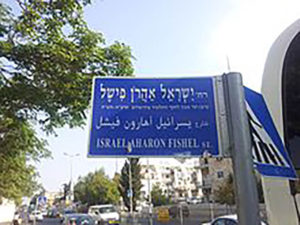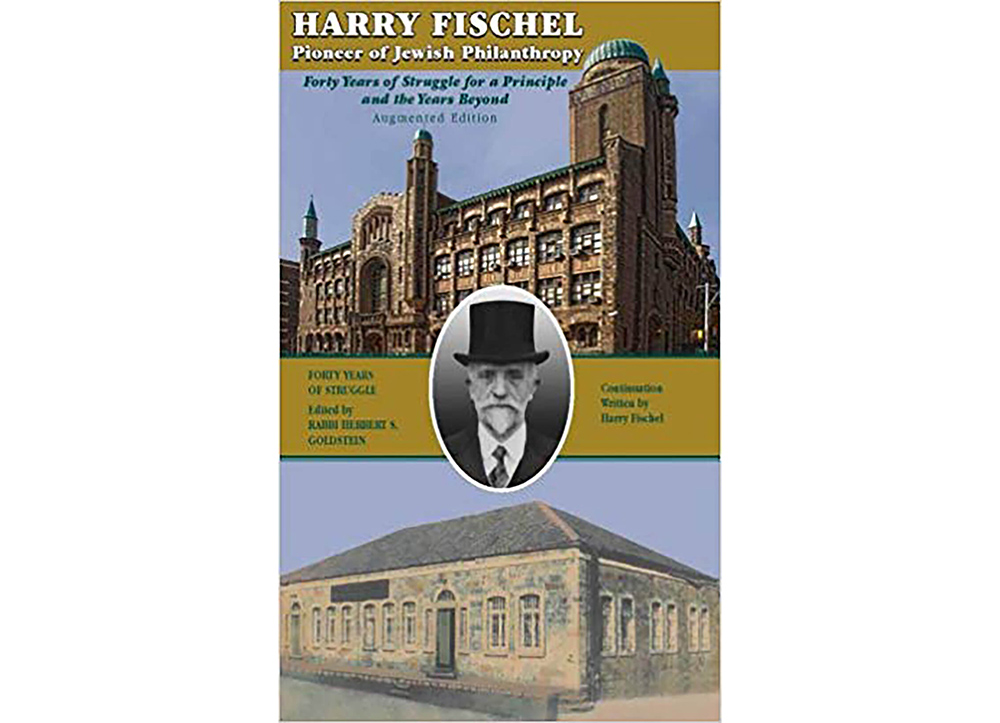Edited by: Rabbi Aaron I. Reichel, Esq.
Reviewed by: Rabbi Reuven Chaim Klein

Many of Jerusalem’s hallowed streets bear the names of 20th century Jewry’s most remarkable figures: Rechov Chafetz Chaim, Rechov HaRav Kook, Rechov Chaim Ozer, Rechov Polanski, Rechov Brandeis, Rechov Straus, and Rechov Magnes. One man’s biography involves all of these esteemed personalities. It recalls the life and times of an individual — Harry Fischel (1865–1948) — who laid the foundations for Orthodox Judaism in America and in Israel. It is no wonder that Mr. Fischel too was honored with a street bearing his name in the City of Gold.
I first came across the name Harry Fischel when studying the work Tosafos HaShaleim, which was published by Machon Harry Fischel. Little did I realize that Harry Fischel is not just the name of a publisher, but the name of a visionary who accomplished so much for the Jewish people.
Mr. Fischel came to America as a penniless immigrant from Eastern Europe. He overcame many trials and tribulations which sought to shake his devotion to Orthodox Judaism, yet he always remained steadfast. This was quite a rarity in his time and place. He used his skills as an engineer and builder to grow into one of the most influential American Jews in his time, but his legacy goes well beyond that. The goal that he set as a young man, together with his wife, was that as soon as he “made it” financially he would dedicate a substantial percentage of his income to philanthropy. Not only did he adhere to this youthful vow, but he actually prioritized his philanthropy over his business interests, turning his attention to business only in order to generate more income for his philanthropic endeavors! At some points he left his business almost entirely in the hands of capable managers, while he devoted himself full-time to volunteer work such as managing schools.
Whenever he felt that a situation needed rectification, Mr. Fischel took the initiative and offered his services. He was an active board member of more institutions than one might think humanly possible; and was honored with speaking at more engagements than most people attend in their lifetime. He was a shrewd businessman who turned his calculating mind to identifying Jewry’s most pressing needs and raising the funds to address them. Those who in any way benefit from Jewish non-profit organizations are indebted to Mr. Fischel for having introduced new fundraising techniques to encourage others to give—alongside his own generous gifts. For example, he was probably the first to introduce matching campaigns. He, of course, was the one doing the matching.
Harry Fischel helped establish and maintain multiple schools, hospitals, interest-free loan societies, relief societies for immigrants and refugees, orphanages, and much more across three continents. In his many philanthropic endeavors, Mr. Fischel laid much of the groundwork and infrastructure for what would later become the post-Holocaust bastions of Jewry in America and Israel. Additionally, in his key role in the Joint, he was instrumental in procuring and distributing funds to aid the Jewish communities in Europe which had been devastated by the First World War.

His efforts focused not only on saving bodies, but on saving souls. He impressed the necessity to care for the needs of religious Jews in every organization with which he was involved, even peripherally. He convinced one “interdenominational” Jewish organization to make its annual luncheon kosher. How did he do it? Some guilt (along the lines of “you call yourself Jewish, and you’re serving such treif food?!”), plus an appeal for inclusiveness (in the spirit of: “let’s have a luncheon which does not exclude the Orthodox”). This granted him permission to oversee the next year’s luncheon. Mr. Fischel ensured that it was a strictly kosher and highly gourmet experience. That won them over. If kosher food could be so good — why not?
Unlike some others, Mr. Fischel recognized the crucial role Jewish education plays in the destiny of the Jewish People. As a result, he was intimately involved in many educational institutions, procuring property for them, raising money for them, and sometimes even helping set policies. To that effect, Mr. Fischel was instrumental in facilitating the merger between Talmud Torah Etz Chaim and Yeshivat Rabbeinu Yitzchak Elchanan (RIETS), which eventually became Yeshiva College and then grew into Yeshiva University. Most famously, Mr. Fischel undertook a daring campaign to raise five million dollars to build Yeshiva College’s Amsterdam Avenue campus.
Harry Fischel was a man of the means and connections to make big changes from the top. But in all of his larger-than-life efforts to save the Jewish world, he didn’t forget the little guys and their needs. In fact, he maintained office hours for the express purpose of making himself accessible to his downtrodden brethren. Anybody down-and-out, or in need of some money to tide him through Passover, could simply walk in and ask for help. Furthermore, when Mr. Fischel moved into an upper-class neighborhood and realized that his regular working-class petitioners could not conveniently come to him, he came to them and set up an office in their locale!
Another item on the long list of Mr. Fischel’s accomplishments was ensuring that there was kosher food available at Ellis Island. At first blush this seems nice but not crucial, until it is understood that Jewish immigrants arrived after a long and grueling journey by boat in very poor conditions. Those who adhered to the rules of kosher made due with highly inadequate fare over the course of this journey. The United States only admitted the healthy and able-bodied. Is it any wonder that many a religious Jew, who washed up on America’s shores seasick and malnourished, were refused entry and sent right back from whence they came? Mr. Fischel gained permission from no less than the President himself to set up a kosher kitchen and allow the hapless refugees a recovery period with wholesome kosher food before being evaluated for admittance.
The Land of Israel held a special place in Mr. Fischel’s heart, and he exerted much effort to visit that enchanted place multiple times throughout his life. This was at a time when airplanes were for the military, and kosher cruises were but a pipedream. He wanted to see the local conditions with his own eyes, so as to best judge how to help its people. And indeed, Mr. Fischel did much to advance the Jewish settlement of the Holy Land both physically and spiritually.
The early Jewish colonists in what was then Palestine grappled with many of the same issues that contemporary Israelis do when dealing with Arabs. Instead of simply ignoring the Arabs and allow their festering anger to bubble up at a later time, Mr. Fischel’s efforts in the Holy Land included them. When Mr. Fischel arranged for Jewish colonists to receive free loans to help them finance buying their homes, this offer was extended to the Holy Land’s Arab residents as well. This showed both pragmatism and sensitivity to others that has few counterparts.






